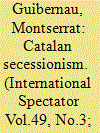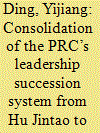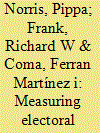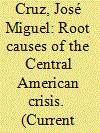|
|
|
Sort Order |
|
|
|
Items / Page
|
|
|
|
|
|
|
| Srl | Item |
| 1 |
ID:
134542


|
|
|
|
|
| Summary/Abstract |
Various factors have triggered the recent shift from devolution to secession in Catalonia: the Aznar government’s lack of response to demands for greater autonomy for Catalonia, the legal challenging of the 2006 Statute of Autonomy of Catalonia and, increasingly, economic arguments as Catalan society endures a harsh economic crisis. After evaluating the impact of the Spanish transition to democracy upon younger generations’ expectations regarding the meaning and content of democracy in post-Franco Spain, it is argued that democracy based upon ‘consensus’ rather than ‘majoritarian democracy’ would be better suited to respond to national minorities’ demands in Spain.
|
|
|
|
|
|
|
|
|
|
|
|
|
|
|
|
| 2 |
ID:
136626


|
|
|
|
|
| Summary/Abstract |
In his seminal work, Gramsci, Hegemony and International Relations, Robert W. Cox reflects upon Gramsci’s political ontology. Analyzing how Gramsci reasoned about the relationship between civil society and the state, he explores the ways in which Gramsci’s conceptualization could be adapted to international relations studies. With a particular focus on the concept of hegemony, Cox maintains that just as hegemonic relationships are formed among social classes within the state, similar structures may be found in the larger global framework. By adopting the Coxian approach, this essay attempts to apply Gramsci’s notion of a historical bloc to the analysis of the post-Cold War world order and the rise of China as a viable architect of a new international governance model. It thus maintains that the contemporary global economic and political developments indicate the ongoing formation of an alternative historical bloc which, despite currently falling short of Gramsci’s conceptualization of imminent radical change, signifies major implications for inter-state relations and world peace and security
|
|
|
|
|
|
|
|
|
|
|
|
|
|
|
|
| 3 |
ID:
136991


|
|
|
|
|
| Summary/Abstract |
The People’s Republic of China went through a peaceful and orderly transfer of power from November 2012 to March 2013, the second one in its 64-year history. The first one was the 2002–3 change of leadership from Jiang Zemin to Hu Jintao. While largely following the same pattern, the recent leadership change, from Hu Jintao to Xi Jinping, illustrated a few interesting and potentially significant differences even as the succession system was further consolidated. This article compares the recent leadership change with the previous one, analyses the differences and discusses their political implications. The increasingly institutionalised procedure for China’s leadership succession now features the state leaders’ tenure being limited to two consecutive five-year terms, and the choice of successors through a gradually broadening elite consensus. For the Chinese Communist Party, the purpose of the term limit is to prolong its one-party rule by having orderly power transfers and avoiding succession crises. The limited term of office is likely to contribute to China’s political stability while promoting a degree of institutionalised intra-party factional competition.
|
|
|
|
|
|
|
|
|
|
|
|
|
|
|
|
| 4 |
ID:
137090


|
|
|
|
|
| Summary/Abstract |
From the perspective of Kosovo, this article contributes to a growing literature focusing on the substance of donor-driven democracy promotion. Drawing on extensive empirical research between 2010 and 2012, the research provides greater insights into which donors are providing what sort of assistance; how the content and focus of aid are decided and formulated; and the behaviour of the European Union (EU) and other large donors compared with small bilaterals and private foundations. By including the category of ‘governance-oriented’ assistance to classify donor initiatives, a more nuanced mapping of priorities and strategies is offered, which distinguishes between those measures designed to engage civil society (developmental), those focusing on institutions and elite level change (political), and interventions specifically designed to promote closer interaction between government and nongovernmental actors. The conclusion reached is that, although overall levels of aid to Kosovo have remained relatively stable since 2008, donor behaviour is in flux, with evidence of an emergent distinction between what larger donors offer and the provision of smaller bilaterals and private foundations. This, it is argued, has serious implications for the capacity of the EU to continue providing extensive aid across a wide range of issues and policy areas as part of its pre-accession
|
|
|
|
|
|
|
|
|
|
|
|
|
|
|
|
| 5 |
ID:
134689


|
|
|
|
|
| Summary/Abstract |
This article traces the political and ideological development of the various strands of Irish Republicanism since 1994, with particular focus on the transition of the Provisional movement from insurgency to government party. In particular, it explores some of the external and internal dynamics shaping this process, such as the origins of Provisionalism as a social movement organization and the changing relationship between the nationalist population and the British state. It concludes by considering both the possible future trajectory of the Provisionals and the potential of dissident republicans to mount a serious political challenge to the status quo in Northern Ireland.
|
|
|
|
|
|
|
|
|
|
|
|
|
|
|
|
| 6 |
ID:
134531


|
|
|
|
|
| Summary/Abstract |
The Affordable Care Act of 2010 (ACA) is a landmark in American social policy that is disrupting America’s “liberal tradition.” It is successfully expanding access and compelling insurers to change their business models to serve more socially-useful purposes; cost control enjoyed initial success but confronts barriers rooted in America’s resilient political economy. The ACA is disrupting long-standing patterns of American politics, introducing new developmental paths that unsettle or, in certain respects, offset the familiar patterns of selectivity, deference to private markets, and “drift” that tend to produce government inaction as economic insecurity increases. New policy arrangements for financing and delivering medical care is ushering in a new politics of US health care that are resetting the terms of future debate; the ACA is also challenging familiar approaches to studying politics including analyses of framing, policy effects and political development, and American political thought.
|
|
|
|
|
|
|
|
|
|
|
|
|
|
|
|
| 7 |
ID:
137052


|
|
|
|
|
| Summary/Abstract |
The need for Communications Intelligence in the Netherlands was first felt by the Dutch military as a consequence of the outbreak of the First World War. The decision to prolong, as in the Netherlands, or establish, as in the case of the East Indies, COMINT facilities belonged to the judicial domain and was primarily related to threats posed by revolutionary movements from within the country. The monitoring of traffic from foreign embassies or consulates happened only when interference from foreign governments was suspected. Japanese expansionism, leading to direct Japanese involvement in the political developments in the East Indies, provided such a case. As a consequence, the fine line between domestic and foreign affairs became thinner still until it entirely vanished during the later part of the 1930s.
|
|
|
|
|
|
|
|
|
|
|
|
|
|
|
|
| 8 |
ID:
134795


|
|
|
|
|
| Summary/Abstract |
Many contentious elections end in disputes about alleged fraud, irregularities, and malpractices. How do we know when these claims are valid and when they are false complaints from sore losers? This article describes a new dataset developed by the Electoral Integrity Project. Based on a survey of election experts, the research provides new evidence to compare how national contests around the world are meeting international standards of electoral integrity. The questionnaire includes 49 key indicators clustered into 11 stages of the electoral cycle, as well as generating an overall summary Perception of Electoral Integrity (PEI) 100-point index. The evidence displays high levels of external validity, internal validity, and legitimacy. The PEI datasets allow researchers to gauge the perceived quality of elections worldwide. This study summarizes the PEI’s research design, compares the quality of elections around the globe, and illustrates how electoral integrity is linked with both democracy and development.
|
|
|
|
|
|
|
|
|
|
|
|
|
|
|
|
| 9 |
ID:
136934


|
|
|
|
|
| Summary/Abstract |
Large-scale social and political protest has characterised political development in a number of post-communist and other transition countries over the last two decades. The colour revolutions in Kyrgyzstan, Georgia, Ukraine, and Serbia, and, most recently, the 2013–2014 protests in Ukraine, have demonstrated the potency of mass action in toppling undemocratic or unpopular regimes, or else in forcing political change. Citizen uprisings in the Middle East had also shattered the dual myths of popular passivity and stability of authoritarian polities in the region. Yet, as Graeme Robertson (2007) rightly notes, according to ‘conventional wisdom’, until 2011–2013 Russia has remained puzzlingly immune to large-scale mass protests despite a growing tide of authoritarianism, rampant corruption, and socio-economic disparities—the cocktail of factors contributing to the recent wave of anti-authoritarian mobilisations in other parts of the world.
|
|
|
|
|
|
|
|
|
|
|
|
|
|
|
|
| 10 |
ID:
136502


|
|
|
|
|
| Summary/Abstract |
Most explanations of economic growth focus on conditions or incentives at the global or national level. They correlate prosperity with factors such as geography, demography, natural resources, political development, national culture, or official policy choices. Other explanations operate at the industry level, trying to explain why some sectors prosper more than others. At the end of the day, however, it is not societies, governments, or industries that create jobs but companies and their leaders. It is entrepreneurs and businesses that choose to spend or not, INVEST or not, hire or not.
|
|
|
|
|
|
|
|
|
|
|
|
|
|
|
|
| 11 |
ID:
136179


|
|
|
|
|
| Summary/Abstract |
Brendan j. Doherty analyzes President Obama’s unprecedented reelection fundraising. He discusses the implications of these developments for governance, for the president’s role as party leader, for Obama’s second term in the White House, and for future presidents.
|
|
|
|
|
|
|
|
|
|
|
|
|
|
|
|
| 12 |
ID:
136565


|
|
|
|
|
| Summary/Abstract |
The ceaseless undocumented migration from Central America can be traced back to institutional failures that have blocked the development of peaceful societies under the democratic rule of law. . . .”
|
|
|
|
|
|
|
|
|
|
|
|
|
|
|
|
| 13 |
ID:
135437


|
|
|
|
|
| Summary/Abstract |
In 1972, the map of Assam changed and its size shrank. While the two valleys remained together, the hills saw emergence of several States. The country soon had to invent a new metaphor to give the new map a
new image after cutting it into parts and then re-joining it into a new composite whole. Instead of referring to the new States separately, the Centre started calling the region by a geographical directional name "North-East." Then in 1976, in the Congress session held at Guwahati, the Assam Chief Minister, Sarat Chandra Sinha, introduced a new metaphor "Seven Sisters" to describe the region. His purpose was to stress the common economic destiny of the seven territorial units of the region and thereby dispel misunderstanding between Assam, the largest State, and the smaller ones, all members of the North-East Council. The metaphor was not simply used in the context of border disputes between Assam and Nagaland as stated by the veteran journalist, Satish Chandra Kakoti1, though it was in the background. The metaphor "Seven Sisters" was not Sinha’s own invention. In 1972, Jyoti Prasad Saikia, then working as a journalist for The Times of India and based at Agartala, first used this description for India’s North-East in a radio talk he delivered on the occasion of the inauguration of Tripura State. Saikia later joined Sarat Chandra Sinha’s personal staff as a press secretary (he was to become a member of the Indian Administrative Service in Assam cadre in later years). Indira Gandhi endorsed this description while addressing the youth convention in the AICC session at Guwahati (then Gauhati) and later the central leaders eagerly appropriated the idea so as to give the region an integrated image. But to understand the compulsion behind the act of dismemberment of a State and the attempt to conceal its broken look, we need to follow the political developments in Assam after India’s independence.
|
|
|
|
|
|
|
|
|
|
|
|
|
|
|
|
| 14 |
ID:
134540


|
|
|
|
|
| Summary/Abstract |
The EU’s response to the Arab Spring is seen as one of its biggest missed opportunities. It has been unable to bring together its different tools of foreign, development and security policy into a strategic joined-up approach. The interconnectedness of the socio-economic and political demands of the popular uprisings across the north of Africa represented a unique opportunity to implement such a joined-up approach. The EU’s ambitious rhetoric and pledges to promote ‘deep democracy’ have not been matched at policy level in the fields of money, market or mobility. Whilst certain member states have sought to overcome the different operating logics of the development, diplomatic and security communities in their regional Arab Partnership programmes, a number of structural and circumstantial factors limit the effectiveness of these attempts, at both the EU and member state level.
|
|
|
|
|
|
|
|
|
|
|
|
|
|
|
|
| 15 |
ID:
136625


|
|
|
|
|
| Summary/Abstract |
This study examines the impact of resource inequalities, also referred to as party capabilities, on defamation litigation between 2000 and 2011 in an attempt to determine whether or not Taiwan’s three-tier court system, consisting of district courts, high courts, and the Supreme Court, is politically biased in its judgments. The empirical findings reveal that superior resources, in terms of party affiliation, election results, sociopolitical connections, and judicial procedure, give defendants a limited advantage in trials involving defamation in campaigns. This study concludes that concern for social stability, legitimacy, and political development in nascent democratic systems could lead to weaker parties being favored by the judiciary, allowing them to come out ahead and achieve an advantage over stronger parties in litigation outcomes.
|
|
|
|
|
|
|
|
|
|
|
|
|
|
|
|
|
|
|
|
|